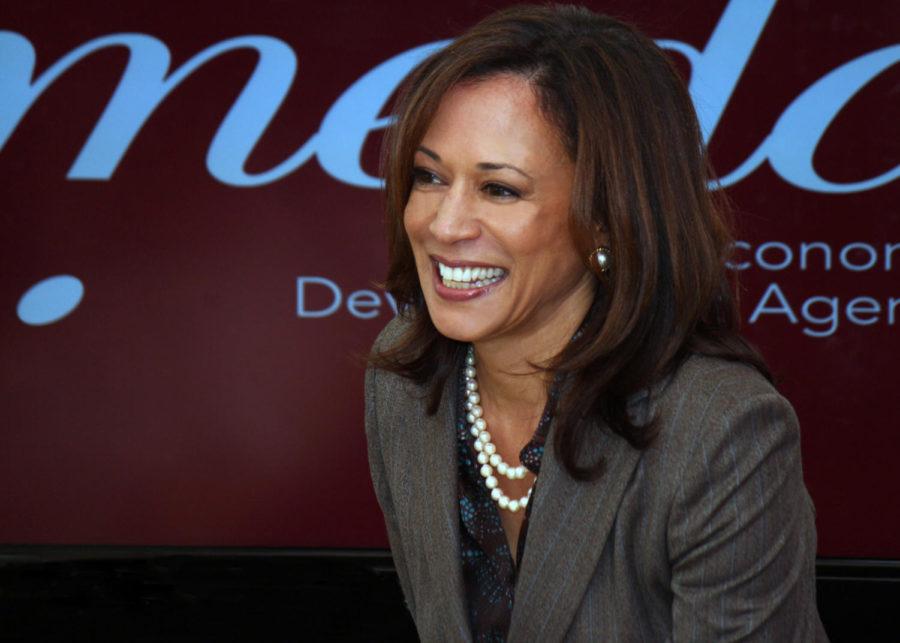Sen. Kamala Harris talks policy with Iowans
Kamala Harris
January 29, 2019
Sen. Kamala Harris introduced herself as a 2020 Democratic presidential candidate to Iowans Monday night during CNN’s first town hall of the political season.
In the hour-long event, Harris proposed numerous recognizable progressive policies in response to a wide range of questions. In her response, Harris continually communicated a theme of commonality.
“The vast majority of us have so much more in common than what separates us,” Harris said. “Enough with these powerful forces that are trying to sell hate and division among us.”
Criminal justice reform
“How do you reconcile your contradictory past?” Riley Fink, senior at Drake University, asked while citing the senator’s opposition to the release of non-violent prisoners and the violation of constitutional rights of various drug defendants in her previous role as district attorney of San Francisco.
“I’ve been consistent my entire career … I am proud of my record,” Harris said.
Harris acknowledged the issues of mass incarceration and disproportionate application of the law, bail and sentencing based on race and economic status.
“That’s the work I’ve been doing in the Senate,” Harris said. “Such as a bill that I have that would seek to reform the bail system in the United States and ultimately get rid of the cash bail system, understanding that it is disproportionately applied.”
The bill, Pretrial Integrity and Safety Act, written by Harris and Sen. Rand Paul (R-KY), maintains that excessive bail harms people from low-income communities and communities of color.
Bail is an amount of money deposited with the court to ensure that the defendant will appear for all court proceedings. If the defendant does not have enough cash to post the entire bail, they may have to sit in jail for what could be weeks, months or years awaiting trial.
In its current form, the bill would provide grant money for states to devise the most effective policies for their own needs instead of a one-size-fits-all federal mandate. The bill also encourages the implementation of a National Pretrial Reporting Program to collect data on the pretrial process — data that is notoriously sparse.
“It’s an economic justice issue as well as a criminal justice issue,” Harris said.
Wealth distribution
A law student from Drake University asked the Senator if, in a society where one out of every five children live in poverty, the insistence of multi-billionaires is morally defensible.
In her response, Harris proposed a policy she calls the Lift Act, “… what we would do is for families who are making less than $100,000 a year, they would receive a $6,000 tax credit that they could receive [as] $500 a month,” Harris said.
The federal poverty line is used to measure a household’s eligibility for certain government benefits. A family of three making less than $22,000 per year meets federal poverty guidelines. Approximately 47.5 million Americans are meeting the federal poverty line, according to the United States Census Bureau.
“In 99 percent of the counties in America, if you are a minimum wage worker working full time, you cannot afford market rate for a one bedroom apartment,” Harris said.
Approaching its decade anniversary, the federal minimum wage has yet to move from $7.25 since July of 2009.
“We have had policies in this country … that have disproportionately benefited the top one percent to the exclusion of working families,” Harris said.
Health care
Harris declared her support for a Medicare for All plan, yielding large applause from audience members.
“Having a system that makes a difference in terms of who receives what based on your income is unconscionable,” Harris said. “It is cruel, and in many situations that I have witnessed, inhumane.”
CNN moderator Jake Tapper asked the senator about the impending elimination of private health insurance implied in Medicare for All.
“Well listen, the idea is that everyone gets access to medical care … let’s eliminate that [private insurance] let’s move on,” Harris said. “Access to healthcare should be understood to be a right … that all people should be entitled to.”
Climate change
When asked if she would fully endorse the Green New Deal, a proposed economic stimulus plan — a modern reflection of Roosevelt’s New Deal that employs renewable resources — Harris said she would support a version of a Green New Deal that incorporates the creation of installation and maintenance jobs of wind turbines and solar panels.
“Our planet is at great risk,” Harris said. “The fact that we have policy makers who are in the pockets of big oil and big coal don’t fully appreciate the fact that we are looking at something that is presenting an existential threat to our country.”
Gun violence
“We aren’t waiting for good ideas. We have the good ideas,” Harris said.
Harris advocated for gun safety laws while insisting that one can be in favor of the Second Amendment and simultaneously understand that assault weapons are unreasonable.
“Assault weapon bans, background checks … we are not waiting for a tragedy,” Harris said. “We have seen the worst human tragedies we can imagine. What’s missing is people in the United States Congress to have the courage to act the right way.”
Breaking barriers
One questioner asked how Harris plans to stay on her message if given the chance to take on Trump.
“The families of our country deserve to have leaders that are focused on their immediate needs, their long-term needs, their hopes and aspirations … and speak to that,” Harris said. “As opposed to … speak[ing] in a way that is about inciting fear as a distraction from the fact that you’re getting nothing done except helping the richest people and the biggest corporations.”







